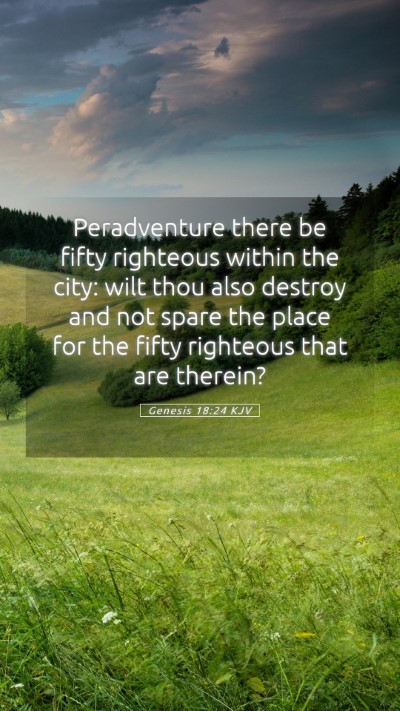Bible Verse Meaning for Genesis 18:24
Verse: "Peradventure there be fifty righteous within the city: wilt thou also destroy and not spare the place for the fifty righteous that are therein?" - Genesis 18:24
Overview: In Genesis 18:24, Abraham engages in a conversation with God concerning the fate of Sodom and Gomorrah. His intercession highlights the themes of justice, mercy, and the value of righteousness in saving a community from destruction.
Insights from Commentaries
-
Matthew Henry's Commentary:
Matthew Henry emphasizes the audacity of Abraham's appeal to God, showcasing his boldness in approaching the divine. He notes that Abraham invokes the existence of the righteous as a basis for sparing the wicked—a reflection of God's character as just and merciful. This engagement demonstrates the principle that the presence of the righteous can impact the judgment of God upon a community.
-
Albert Barnes' Exposition:
Albert Barnes highlights the significance of Abraham's question and its implications regarding God's justice. He suggests that Abraham is aware of God's justice in punishing sin but challenges the notion of collective punishment without mercy. Barnes notes that Abraham's inquiry reflects a profound understanding of God's character—one who is willing to listen and engage with humanity.
-
Adam Clarke's Commentary:
Adam Clarke delves into the rhetorical nature of Abraham's question and its rightness. He posits that Abraham's concern is not merely for the righteous but extends to the entire city, advocating for mercy based on a smaller subset of virtue. Clarke illustrates how this dialogue sets a precedent for intercessory prayer and the importance of righteousness in achieving God's favor for a community.
Key Themes
-
Divine Justice and Mercy:
This verse encapsulates the tension between divine justice and mercy. Abraham's inquiry reflects the belief that God balances justice with mercy, sparing cities for the sake of the righteous.
-
The Role of Intercession:
Abraham's role as an intercessor highlights the power of prayer and the influence one can have on divine judgment. It underlines the importance of standing in the gap for others.
-
Importance of Righteousness:
The presence of righteous individuals is portrayed as essential for a community. Their influence could potentially avert disaster, showcasing the connective thread between personal righteousness and communal well-being.
Cross References
- Genesis 18:23: Abraham's plea for Sodom and the moral query concerning the righteous.
- Exodus 32:11-14: Moses intercedes for Israel, reflecting similar themes of divine mercy.
- Luke 18:7-8: The parable of the unjust judge and God’s response to His elect who cry out for justice.
Application of Genesis 18:24
This verse encourages believers to understand the significance of righteousness in their own lives and communities. It calls for an active engagement in intercession and highlights the need for standing firm in moral integrity as a means of influencing societal conditions.
Conclusion
In conclusion, Genesis 18:24 serves as a potent reminder of God's character, the importance of individual righteousness, and the power of prayer. It stimulates a deeper Bible verse understanding and invites readers into the dialogue of moral advocacy within Scripture analysis.
This analysis of Genesis 18:24 continues to resonate in various contexts, including Bible study groups and online Bible study, providing valuable Bible study resources and materials for those seeking to deepen their Bible study insights.


